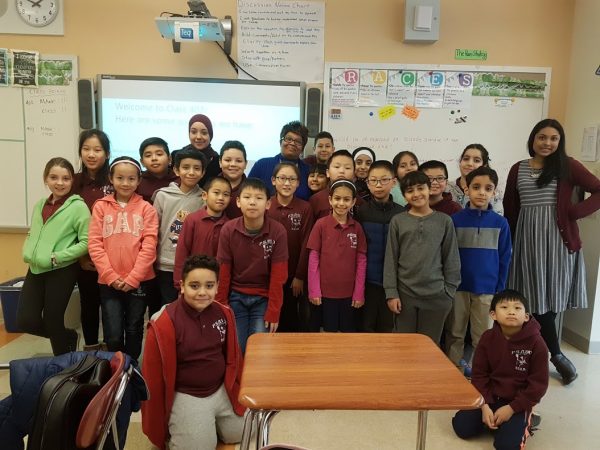2018 School Spending Survey Report
Linda Blackmon Lowery, Youngest Selma Marcher, Inspires Students
Civil rights activist marched from Selma to Montgomery as a teenager. Now she seeks to inspire the next generation.

Lynda Blackmon Lowery (center, in purple) visits students in Brooklyn. Photo courtesy Alla Umanskaya
In March 1965, Lynda Blackmon Lowery was the youngest person to march from Selma to Montgomery in an effort to register black voters as part of the civil rights movement. She was beaten in the historic confrontation on the Edmund Pettis Bridge and required stitches to close two cuts on her head. Lowery returned to march a few weeks later, one of only 300 people allowed to start from Selma again, cross the bridge—with an escort from National Guardsman—and walk for days to Montgomery, where they were joined by thousands of people. She turned 15 during that march that helped bring about the Voting Right’s Act. As part of Martin Luther King Jr. Day programming, school librarian Alla Umanskaya invited Lowery to PS/IS 30 Mary White Ovington school in Brooklyn, NY, to tell her story directly to the students. For her part, Lowery wants kids to know that young people can make a difference. Lowery’s life as a teen in the civil rights movement is documented in her memoir, Turning 15 On The Road To Freedom: My Story of the 1965 Selma Voting Rights March (Dial, 2015), a middle grade book as told to Elspeth Leacock and Susan Buckley. Before Lowery came to the Brooklyn school, the entire student body went to see an off-Broadway play based on her memoir. (No easy feat—That’s 16 buses and about 600 students.) Umanskaya says the children loved the show, which was adapted and directed by Ally Sheedy and featured actress Damaras Obi. The students were able to ask Obi and Buckley questions afterward. Less than two weeks later, the kids at PS/IS 30 met Lowery herself. The Selma, AL, resident came to New York and spoke with third and fourth grade classes individually, as well as presenting assemblies to the sixth, seventh and eighth grades. Along with telling her story, Lowery shared songs from freedom marches and answered their questions. "The older kids asked less political questions,” Lowery says. “They wanted to know, ‘How and why I was so afraid? Would I march again? What would I tell my teenage self now?’ Their questions were more personal. The younger kids asked more politically aware, more socially aware questions. It was the reverse of what I thought [it would be], but all of the questions were thoroughly important.” Lowery says she loves the diversity of the school, where many students are recent immigrants, according to Umanskaya. It was one of the reasons the librarian invited Lowery for the visit. “I believe in power of a word, either written or spoken,” Umanskaya says. “I know she will uplift our students, majority of whom are recent immigrants and we want them to experience true democracy of this country without any inequality, discrimination or racism. This is a dream, of course, and we are far away from it. People [such as] Lynda are models for young people to follow. The fact that Lynda is coming through the library program embracing her book, theater trip and primary source puts the library in the central place of academic and civic learning.” A lot has changed for these kids in the time since Lowery’s book was published, the author and activist says. “Two years ago, we had an African-American president and things were a lot easier,” says Lowery. “He was welcoming members of their family and them to this country. Now, just two short years later, they're sitting down worrying about whether their parents or they will be sent back to a country where lives would be in danger. “Between 2015 and the beginning of 2017, children became a force, because they became politically and socially aware.” She believes they will turn that awareness into action. "I saw a lot of history-making leaders in that class," Lower says. "I saw a lot of children that will grow up and make changes, positive changes, for everybody." Some of those kids were directly inspired by Lowery, according to Umanskaya. “One seventh grader told me that she has a clear idea now what she can do to help our country be better - ’I need to be kind to people who are around me, and try to help them if I can.’,” Umanskaya says. Lowery never imagined having this kind of impact. “It's an awesome feeling,” she says. “I still am in awe and wonder thinking how this book, how my story, which I didn't think was anything to anybody or would be anything to anybody, how it is important to so many lives.”RELATED
RECOMMENDED
CAREERS
The job outlook in 2030: Librarians will be in demand
CAREERS
The job outlook in 2030: Librarians will be in demand
ALREADY A SUBSCRIBER? LOG IN
We are currently offering this content for free. Sign up now to activate your personal profile, where you can save articles for future viewing






Add Comment :-
Comment Policy:
Comment should not be empty !!!
Ellen Bayer
It's so wonderful how school librarian s are able to serve as a window to the world for our students. Thank you Ms. Umansakaya for bringing Ms. Lowery to your school.Posted : Jan 26, 2018 06:42